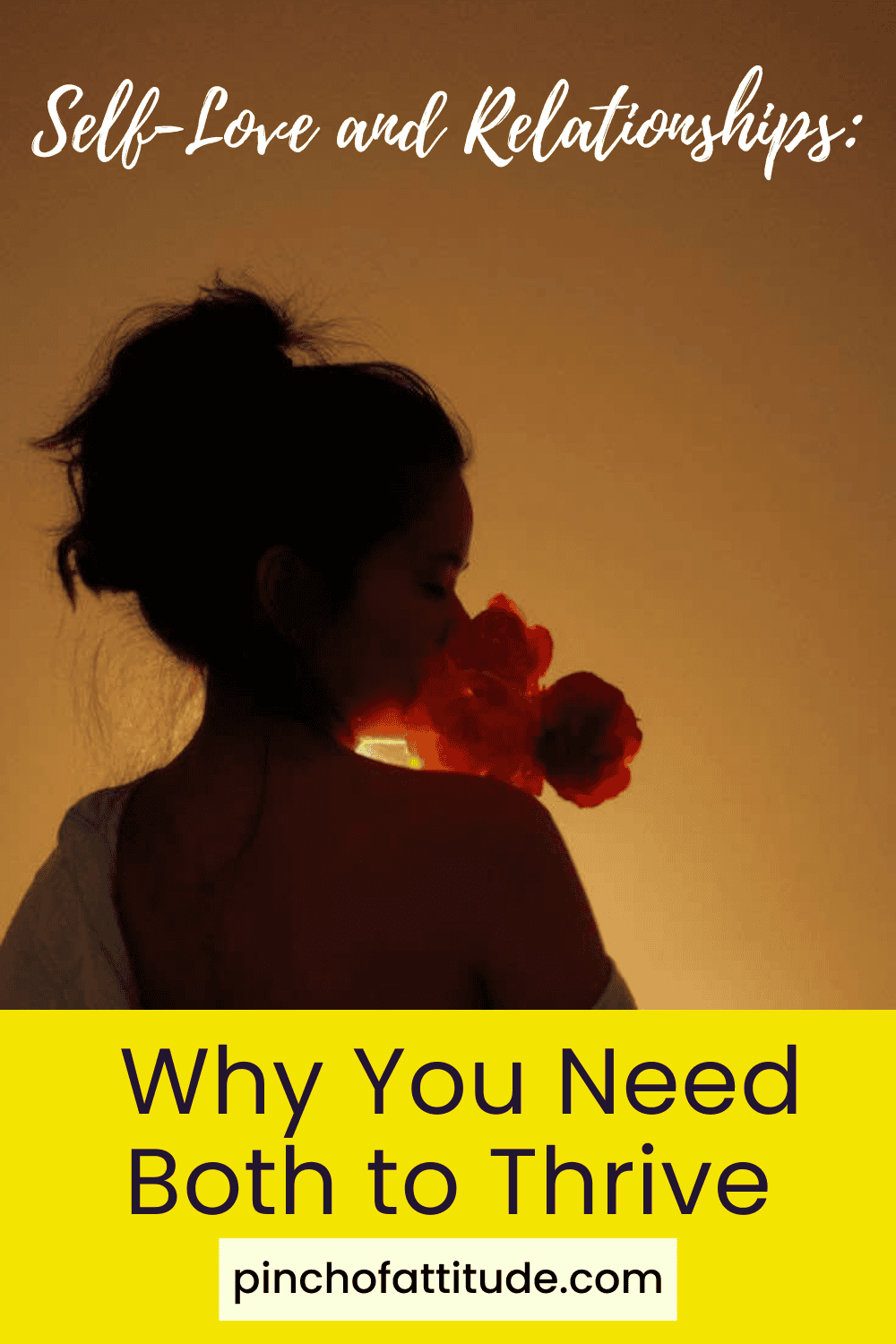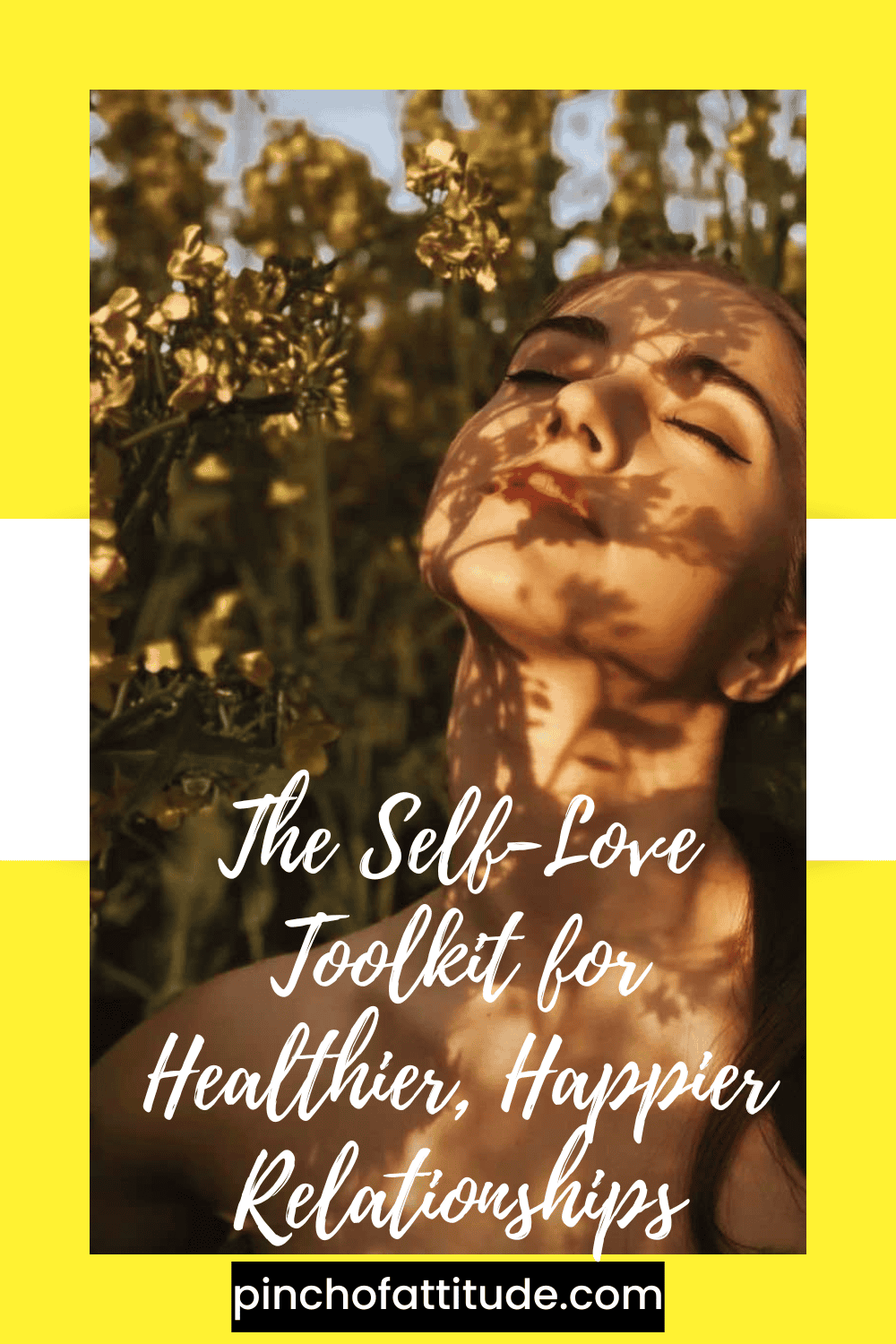Do you know that feeling of being completely drained, trying everything you can to accommodate a relationship, only to feel like you don’t have a solution?
You’re not the only one, and I’ve been there too. It’s impossible to pour love and support into other people’s cups when yours is empty.
Through trial and error, I’ve learned a lot about prioritizing self-love in relationships. It isn’t just about your own wellness, but about nurturing and creating a stronger bond with others.
We need a combination of self-love and compassion for others in order to grow both individually and in a relationship.
So let’s unpack the foundational lessons of balance in relationships, based on the science of self-love.
We’ll discuss why it’s important to make sure to take care of yourself, how to be present for others, and how to set proper boundaries so the two efforts work harmoniously together.
I’m so excited! Let’s go!
- Loving yourself in relationships contributes to developing emotional resilience, enabling you to handle relationship challenges and align with your values during conflicts.
- Creating healthy boundaries is key to self-love, which involves understanding both your and your partner’s needs. This avoids pitfalls like emotional abuse or codependency.
- Self-love helps with personal growth and encourages better communication, trust, and intimacy in your relationship. It starts with self-acceptance and reflection, leading to better self-understanding and open sharing of feelings with yourself and your partner.
Table of Contents
What is Self-Love in a Relationship?
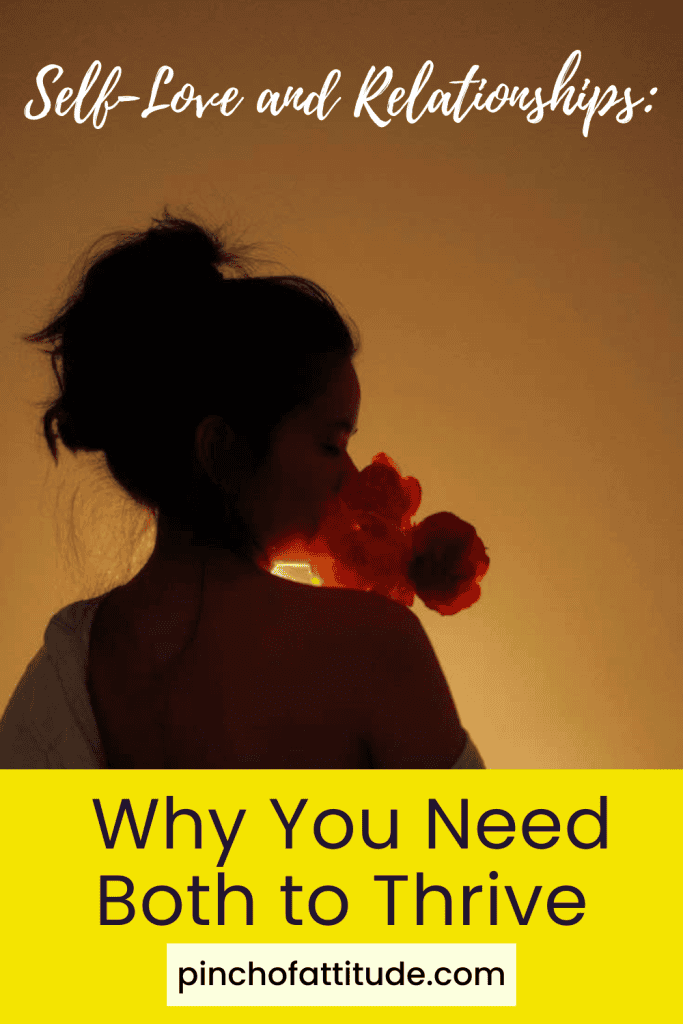
Self-love in a relationship is about respecting yourself, knowing your worth, and honoring your needs. It means setting boundaries, speaking your truth, and making time for things that nourish you. When you take care of yourself first, you’re not only stronger for yourself but also for your relationship.
When you’re in a relationship, it’s easy to lose yourself in the needs of your partner. But don’t forget YOU. Your feelings, your desires, and your dreams, matter too! Taking care of yourself doesn’t mean you’re selfish or neglecting your partner.
It’s about embracing that if you’re not at your best, neither is the relationship. Invest in yourself and pursue your passions, and watch how it transforms not only you but your relationship as well.
That’s the magic of self-love in a relationship. Remember, your relationship with yourself is the foundation for everything else, so make it a strong one!
10 Reasons Why Self-Love Matters in a Relationship

Self-love matters in a relationship because it sets the tone for how you allow others to treat you. It also enables you to contribute positively to a relationship.
When you truly love and respect yourself, you’re more likely to choose a partner who will treat you with the same love and respect.
You’re also more likely to communicate effectively and maintain healthier boundaries, which are keys to a successful relationship.
Below are my personal reasons why self-love is important in successful relationships and how you can love yourself in a relationship.
1. You Set The Standard
When I learned to truly love myself, I realized I had been tolerating behavior from partners who did not respect or honor my worth.
Self-love made me set the standard higher, showing others that I deserve love, respect, and kindness, just as I offer these to them.
2. You Maintain Your Individuality
In the past, I used to sacrifice my interests for the sake of my relationship. But when I started to love myself, I recognized the importance of maintaining my identity.
My unique hobbies and passions brought a new layer of depth to my relationships and encouraged my partner to explore their interests too.
3. You’re Able to Set Healthy Boundaries
Through self-love, I discovered the importance of setting boundaries. I became clear on what was and wasn’t acceptable for me in a relationship. This protected my mental and emotional health and fostered mutual respect between me and my partner.
4. You’re Less Likely to Tolerate Mistreatment
I used to believe that tolerating ill-treatment was a sacrifice for love. When I began to love myself, I realized that love should never entail disrespect or abuse. It made me step away from such situations because I recognized I deserved better.
5. Developing Emotional Resilience
Did you know that your emotions are like a muscle? It’s true, and you need to do reps, just like in the gym, to strengthen your ability to handle the ups and downs of life.
This increases emotional resilience, which helps you to bounce back from relationship challenges and disappointments.
If you’re not feeling good about yourself while you’re having a conflict with your partner, you won’t come from a place of strength, and you’re less likely to honor your values.
Some ways to develop emotional resilience include breathing practices, therapeutic work with a trained professional, and adding more exercise and movement into your life.
6. Creating Healthy Boundaries
Boundaries are one of the most important ways that we demonstrate self-love. When you set a boundary, you’re letting someone know that you’re confident in what you do and don’t want. They also protect your energy and well-being.

So make sure to ask what your significant other’s needs are and take them into consideration when deciding where to draw the line in the sand.
Taking the time to do this helps to avoid common relationship pitfalls like emotional abuse or codependency.
7. Promoting Personal Growth
It’s in our nature to grow and strive in the world. And as you may have guessed, creating a lifestyle around trying new things and improving your skills is a self-love practice.
It works great in relationships because it inspires and motivates our romantic partners, and helps us to better support their growth path.
Make sure you challenge yourself to try new hobbies or dive deeper into the ones that you already love and enjoy. You can even invite your partner to join in on the fun if he’s curious or has a shared interest.

8. You Can Fully Contribute to the Relationship
When I started to love myself, I found an internal source of love and happiness. I could give more to my partner without expecting them to fill my emotional needs. I became a more caring and understanding partner, contributing positively to the relationship.

9. You Attract a Healthier Partner
When I started loving myself, I noticed a shift in the kind of partners I attracted. Instead of people who took advantage of my insecurities, I began attracting those who respected and loved me for who I was. They mirrored the love I had for myself.
10. You’re More Resilient During Relationship Challenges
Self-love made me stronger in the face of relationship issues. When a disagreement arose, I could handle it with confidence, knowing that it wouldn’t diminish my worth or value.
The Science Behind Self-Love and Relationship Success
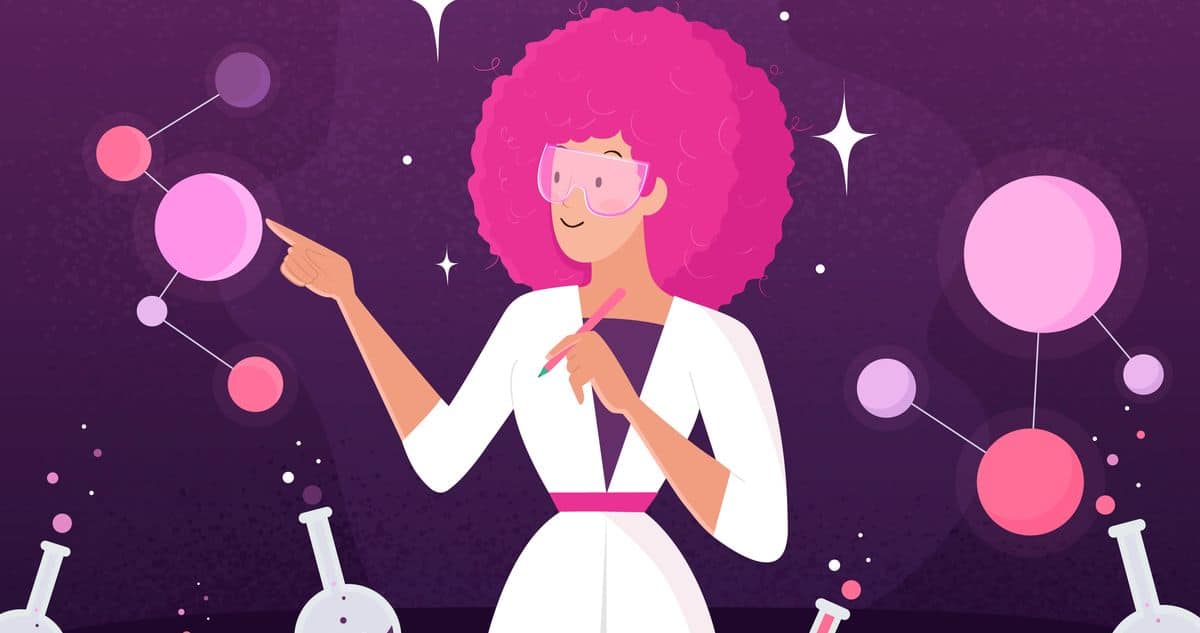
When you truly embrace self-love, you’ll notice your energy shifting. You’ll have more clarity and awareness around your needs and those of others.
These aren’t just changes happening in your mind, but also in your body. I literally felt like a new woman as I nurtured my capacity for self-love because it’s a real shift that’s proven through science and research.
First, you need to understand what self-love is all about. Self-love means having a high regard for your own well-being and happiness, you don’t need a man or anyone else to love who you are. It means taking action to meet your needs, not sacrificing your well-being to please others.
You don’t need to sacrifice your needs for those of others. And we can be kind to others in the process.
One of the oldest scientific ideas behind self-love deals with the practice of self-compassion.
Dr. Kristin Neff, Co-Founder of the Center for Mindful Self-Compassion, highlighted the importance of treating yourself with kindness, understanding, and empathy, just as you would treat a close friend or loved one.
She shared real-life examples of couples focusing on compassion through consistent practices and documented how it helped both people work together to overcome common relationship obstacles.
Moreover, research in the field of positive psychology explains that loving yourself can promote greater happiness in relationships.
Your relationship is meant to improve the quality of your life, making it essential to create a positive mind self, and environment to help it to thrive.

Most importantly, communication is a huge indicator of how successful a relationship will be. This study followed a selection of couples for 3 years and determined that happy couples with a good sense of self were able to better communicate with each other.
There’s a wealth of research when it comes to self-love while in a relationship.
If you want to learn more, check out books and workbooks that further document studies, or connect with a therapist or relationship coach whose methods are based on scientifically proven methods of developing self-love.
Finding Self-Love Before Getting Into a Relationship
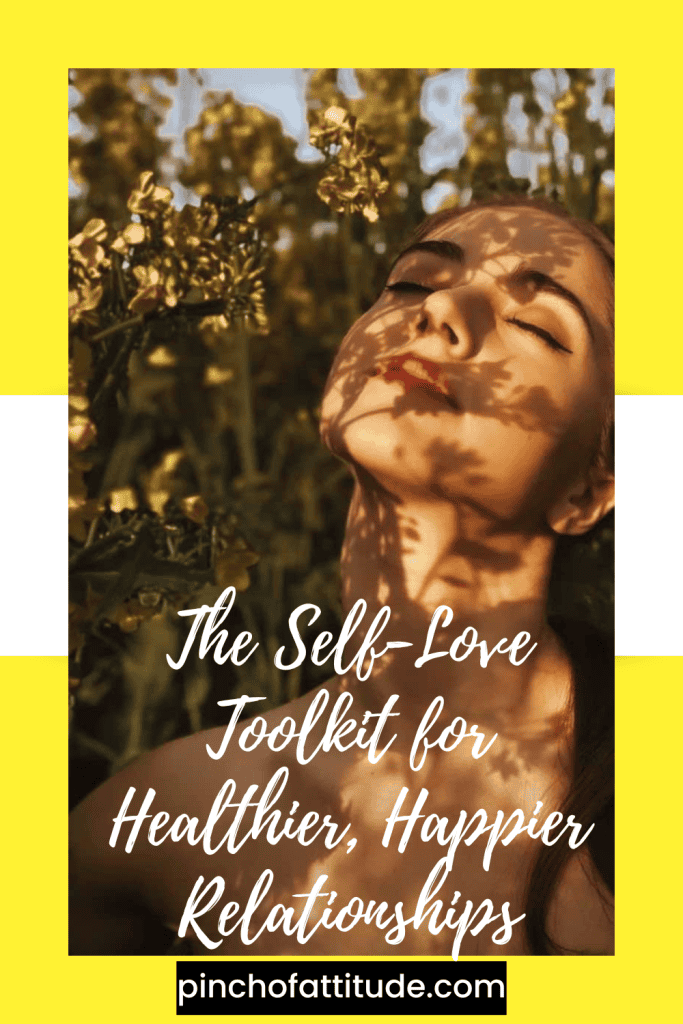
You can’t truly love another until you love yourself. I know, you’ve heard it before, but bear with me here. Loving yourself isn’t about being self-centered or narcissistic. It’s about recognizing your worth, accepting your flaws, and being content with who you are.
Think about it. How can you fully invest in someone else’s happiness when you’re still figuring out what makes YOU happy? You’ve got to pause, dig deep, and find that inner joy and confidence.
Here’s a 5-second exercise you can do right now: Look in the mirror and say, “I am enough.” Say it until you believe it. Because you are enough, just as you are.
Start a self-love routine. Set aside time for yourself. Read a book, go for a walk, meditate – whatever makes you feel at peace. It’s not selfish; it’s self-care.
Once you’ve found that love for yourself, you’ll see relationships in a new light. You’ll enter them not because you need someone to complete you, but because you want to share the complete, wonderful you with someone else.
And when that happens, you’ll find a love that’s more profound and fulfilling than you ever thought possible.

Self-Love After a Breakup or Toxic Relationship
You’ve just come out of a breakup or a toxic relationship, and it feels like the world has turned upside down. But guess what? This is your moment. It’s time to rediscover the incredible person you are and fall in love with yourself all over again.
First, let’s acknowledge those feelings. They’re real, and they’re yours. Feel them, embrace them, but don’t let them define you. You’re stronger than that, and you know it.
Now, about those boundaries. You’ve learned some tough lessons, but they’re going to guide you to a place where you respect and honor yourself like never before. Set those boundaries and watch how they transform not only you but your future relationships as well.
Invest in yourself. Dive into hobbies, exercise, or simply spend time with the people who make you feel alive. This is your time to rebuild, rediscover joy, and grow in ways you never thought possible.
Finding yourself after a toxic relationship can be especially overwhelming. Don’t hesitate to seek professional help. There’s no shame in needing support, and it’s a sign of strength to ask for it.
Finally, embrace this new beginning. It’s not just an end; it’s a launchpad. You’re stepping into a new chapter filled with growth, self-discovery, and a renewed sense of self-love and confidence.
Healing takes time, but you’re on a journey toward something beautiful. Be patient with yourself, and know that you’re not just moving on; you’re moving up.
Develop a Strong Relationship by Focusing on Yourself
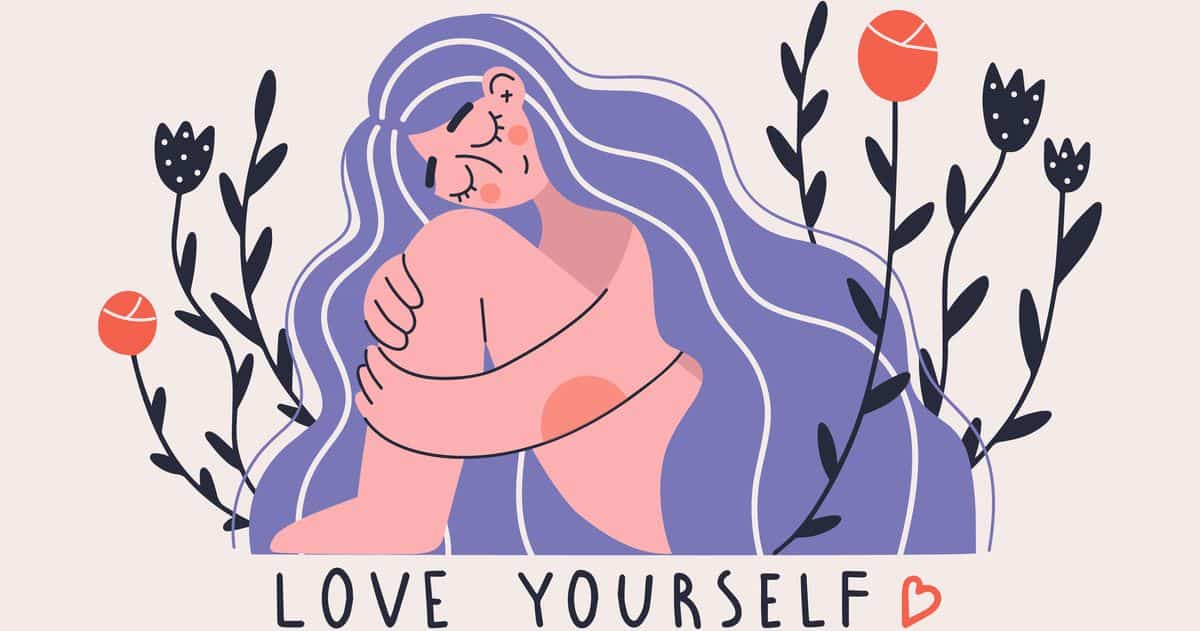
Do you know what’s fascinating about relationships? You can’t control the other person, but you can control yourself.
Do you want a stronger connection with someone? Start by strengthening the connection with yourself.
It’s time for you to dig deep, recognize your worth, and pinpoint your needs. Embrace self-love, not selfishness! When you feel good about yourself, you bring positive energy into your relationships.
That five-second decision to work on YOU can lead to lifetime changes in all your connections.
Say goodbye to blame, and say hello to taking responsibility for your happiness. Ask yourself every morning, “What can I do today to be the partner I want to be?” Then, count down 5-4-3-2-1, and get started. You’ll discover the more you invest in yourself, the more others will invest in you.
It’s not about changing your partner; it’s about changing how you show up. When you’re happy, confident, and clear about what you want, your relationships transform. That’s the power of YOU.
Start today. Take that five-second leap, and build a relationship that’s strong, fulfilling, and true to who you are. The transformation begins with you.
Related Posts:
Frequently Asked Questions
Why is self-love important?
Self-love is important because it sets the foundation for healthy and fulfilling relationships, friendships, and personal development. By practicing self-love, you develop a strong sense of self-worth and are capable of recognizing and maintaining healthy boundaries.
How to practice self-love in marriage?
You can practice self-love in marriage by being aware of your different needs during different phases of the relationship. For example, if you’re new to a relationship, self-love may look like setting boundaries and learning how to communicate with your partner. But if you’re years into a relationship, your self-care focus may be more about making quality time with your children or mixing up date nights to keep your relationship fresh.
How to love yourself first?
Loving yourself first means prioritizing your needs, dreams, and goals. Acknowledge your strengths and accept your imperfections. Focus on building a nurturing and non-judgmental relationship with yourself. Experiment with self-care activities, such as listening to music or journaling, that help you connect with your inner world and nurture self-compassion.
Ways to work on self-love?
The first way to work on self-love is by committing yourself to the practice of checking in with yourself on a regular basis. From there, each person’s journey is unique, so you’ll need to find what works for you.
How to love yourself more?
Loving yourself more means cultivating an unconditionally kind and forgiving relationship with yourself. Focus on your positive traits and achievements, and embrace your perceived flaws. Pay attention to your self-talk and make it more supportive and nurturing.
How to maintain self-love in relationships?
Maintaining self-love in relationships is about regularly reviewing your needs. Nothing can be maintained without regular check-ins. So make sure to take time at least once a month to review where you’re at and decide where you need to make changes to improve your relationship with yourself.

